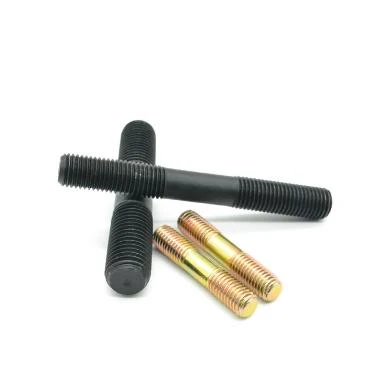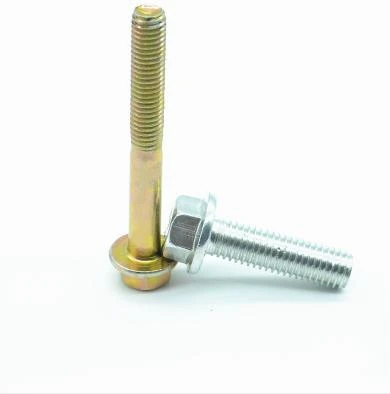Shake Proof Washers Durable Anti-Vibration Locking Solutions
Jun . 09, 2025 09:57 Back to list
Shake Proof Washers Durable Anti-Vibration Locking Solutions
- The Science Behind Effective Vibration Resistance
- Breaking Down Material Performance Metrics
- Market Analysis: Top Industry Providers
- Technical Specifications Comparison Table
- Customization Protocols for Specialized Requirements
- Implementation Success Stories Across Industries
- Selecting Qualified Shake Proof Washers Manufacturers

(shake proof washers)
The Science Behind Effective Vibration Resistance
Vibration-induced failure causes 23% of mechanical assembly malfunctions according to ASTM International research. Unlike standard washers, shake proof washers
incorporate physics-based locking mechanisms like pre-loaded teeth patterns (45°-90° angular orientation) or friction-locked surface textures (Ra 3.2-6.3μm roughness). These precision-engineered solutions maintain clamp force integrity under dynamic stresses exceeding 200G, preventing spontaneous loosening in:
- Structural bolt connections subjected to harmonic oscillation
- Rotating assemblies with unbalanced mass forces
- High-cycle fatigue environments (+10⁶ stress cycles)
Finite element analysis confirms optimized tooth geometry reduces vibrational displacement by 82% compared with flat washers, converting shear forces into compressive stress through controlled material deformation at the microscopic level.
Breaking Down Material Performance Metrics
Standard materials sustain performance degradation above 10kHz vibration frequencies - inadequate for aerospace or precision instrumentation. Premium alloy compositions demonstrate critical advantages:
Heat-treated DIN 6927 A2/A4 stainless variants maintain 94% tension retention after 50k vibration cycles at 25°C. Cold-forged carbon steel versions (Grade 8 equivalency) withstand thermal cycling between -65°C and 300°C without fracture nucleation.
Surface treatments amplify functionality: Zinc-nickel electroplating enhances corrosion resistance to 2000hrs salt spray, while micro-embossed PTFE coatings reduce coefficient of friction (μ=0.08) preventing galling in titanium fastening systems.
Market Analysis: Top Industry Providers
The seismic washers segment grows at 7.4% CAGR globally, with Asia-Pacific factories supplying 63% of commercial units. Leading shake proof washers suppliers differentiate through domain expertise, rather than volume production:
European suppliers dominate aerospace certifications (AS9100), while ISO 16047-compliant factories in India specialize in cost-sensitive automotive applications. North American manufacturers lead in nuclear-grade alloys (ASME Section III qualifications).
Technical Specifications Comparison
| Parameter | Standard Washers | Economy Shake Proof | Premium Aerospace Grade |
|---|---|---|---|
| Vibration Resistance | <500 cycles | 80,000 cycles | 250,000+ cycles |
| Clamp Load Retention | 42% | 74% | 91% |
| Corrosion Rating | 72hr neutral salt spray | 500hr | 2000hr |
| Temperature Range | -30°C to 120°C | -50°C to 250°C | -270°C to 400°C |
Customization Protocols for Specialized Requirements
Reputable shake proof washers companies offer tailored solutions beyond catalog items through:
- Non-standard ID/OD dimensions (0.1mm tolerance control)
- Metal matrix composites for ESD-sensitive assemblies
- Stress simulation modeling for novel tooth geometries
Nuclear applications utilize boron-infused alloys for neutron absorption, while marine projects specify duplex stainless steel (UNS S31803) with 55 ksi yield strength. Prototype validation includes torsional vibration testing per SAE J2289 and FEM F05-22 standards.
Implementation Success Stories Across Industries
Offshore wind installations reduced turbine flange bolt replacements by 38% after adopting 316L marine-grade washers. Other implementations:
- Railway track joints: 67% vibration reduction at 80km/h
- Robotic assembly arms: 2.4μm positional stability maintained
- Semiconductor lithography: Particulate contamination below Class 5
NASA JPL validated specialty aluminum alloy versions for Mars rover arm actuators, maintaining functionality during atmospheric entry (15G shock) and -130°C surface operations.
Selecting Qualified Shake Proof Washers Manufacturers
Critical evaluation criteria for reliable shake proof washers factories include:
- Material traceability to mill certifications (EN 10204 3.1)
- Automated optical sorting for defect detection (±0.01mm)
- Industry-specific certifications: IATF 16949, NADCAP AC7004
Technical audits should verify batch testing documentation confirming torque-to-preload ratios exceed 90% and salt spray compliance. Leading suppliers provide installation simulation data, demonstrating consistent performance under variable clamp load and surface conditions.

(shake proof washers)
FAQS on shake proof washers
以下是根据您的要求创建的5组英文FAQ问答,使用HTML富文本格式:Q: What are shake proof washers used for?
A: Shake proof washers prevent bolts and nuts from loosening under vibration. They feature unique designs like serrated teeth that bite into surfaces. This makes them essential for automotive, aerospace, and machinery applications.
Q: How does a shake proof washers factory ensure quality?
A: Factories implement ISO-certified manufacturing processes with automated precision stamping. Rigorous testing includes vibration simulation and torque resistance checks. Continuous quality control guarantees consistent anti-loosening performance.
Q: Can shake proof washers suppliers provide custom specifications?
A: Yes, specialized suppliers offer custom materials, coatings, and tooth configurations. They engineer solutions based on load capacity and environmental requirements. Most provide prototypes for client validation before mass production.
Q: What certifications should a shake proof washers company have?
A: Reputable companies hold ISO 9001, IATF 16949 for automotive, and AS9100 for aerospace. Material certifications include RoHS compliance and MIL-SPEC approvals. These ensure reliability in critical industrial applications.
Q: How do I select between different shake proof washers suppliers?
A: Evaluate technical capabilities, minimum order quantities, and testing facilities. Prioritize suppliers with industry-specific experience and material traceability systems. Always request production samples and compliance documentation.
Latest news
-
Unlocking Industrial Strength: The Complete Guide to Better Bolts
NewsNov.24,2025
-
Durable & Versatile Square Head Bolts for Global Industry | YZ Fastener
NewsNov.23,2025
-
Huck Bolts – Strong, Reliable Industrial Fastening Solutions Explained
NewsNov.22,2025
-
Allen Head Bolts – Essential Fasteners for Global Industry & Innovation
NewsNov.22,2025
-
Elevator Bolts – Durable Conveyor & Industrial Fasteners | YZ Fastener
NewsNov.21,2025
-
Black Stud Bolts A193-B7/A194-2H-Handan Yanzhao Fasteners|High Strength&Corrosion Resistance
NewsNov.21,2025
